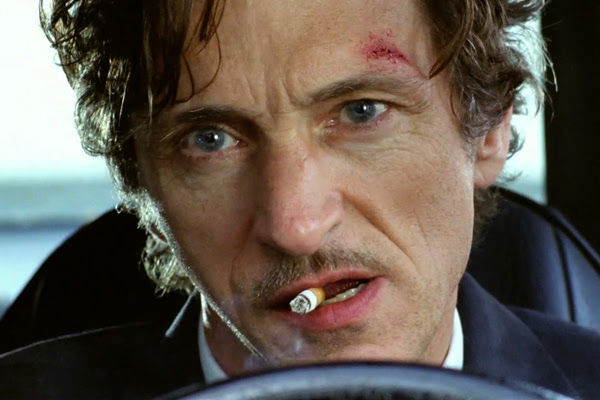 A delayed title card is a bold cinematic move, a deliberate tactic usually used to punctuate a powerhouse setpiece full of invention and intrigue (see: “Eternal Sunshine of the Spotless Mind,” “127 Hours”). It jumps in as a provocation, as though to say, “You thought that was cool? We haven’t even shown you the opening credits yet, so strap in.” In “Too Late,” after a 15-minute single take involving a fedora-wearing Rider Strong and Dash Mihok as hiking drug dealers talking movie tropes, a stripper who drops the word “sanguine” in conversation with a gangster-turned-park ranger, and sloppily executed, Altman-esque zooms across the skyline of downtown Los Angeles, my only thought instead to it all was simply “Jesus, no.”
A delayed title card is a bold cinematic move, a deliberate tactic usually used to punctuate a powerhouse setpiece full of invention and intrigue (see: “Eternal Sunshine of the Spotless Mind,” “127 Hours”). It jumps in as a provocation, as though to say, “You thought that was cool? We haven’t even shown you the opening credits yet, so strap in.” In “Too Late,” after a 15-minute single take involving a fedora-wearing Rider Strong and Dash Mihok as hiking drug dealers talking movie tropes, a stripper who drops the word “sanguine” in conversation with a gangster-turned-park ranger, and sloppily executed, Altman-esque zooms across the skyline of downtown Los Angeles, my only thought instead to it all was simply “Jesus, no.”
READ MORE: 12 Great & Not-So-Great Debuts From Screenwriters-Turned-Directors
What first-time director Dennis Hauck establishes here is a bizarro LA that’s just picked up from where “Pulp Fiction” left off, and yet where “The Boondock Saints” hasn’t happened yet — it’s the only timeline in which making a non-linear ensemble crime drama appears like a supremely fresh idea. Overall a genre throwback, the film pits private detective Sampson (a game John Hawkes) against a cast of strip club owners, thugs, and dames on a case to find a missing woman (Crystal Reed), and lets nary a beat of celluloid flicker by without a slick ‘70s jukebox tune or rapid-fire dialogue exchange jolting into the mix.
Hauck and DP Bill Fernandez made the decision to shoot entirely on 35mm film, and they work that element into the formalist makeup of the narrative: each new situation that Sampson encounters is covered in one Steadicam take, and the scene cuts or fades to black just as the print’s cigarette burn blips on the top right of the screen. Couple that with a section that revolves around an ex-dancer moonlighting as a drive-in theatre projectionist, and you’ve got a film drunk on the magic of celluloid. But a 35mm film mag equaling a scene is less a complete narrative and more a fall semester at NYU; while Alejandro González Iñárritu led a brilliant cast on a tightwire act in “Birdman” via similar restrictions, it’s obvious here what form looks like plastered onto an unjustified story.
I counted one truly affecting moment in the film, and it comes from actress Natalie Zea as a mother who loses her only daughter. Granted, the scene around it is one big emotional third-person confession to remind us that we could be watching “Paris, Texas” instead, but Hauck wisely cuts the music, tricks, and quips to stay focused on Zea’s face — the actress actually conveys her character’s thoughts beautifully rather than letting the flourishes flood in to do the job.
The other performances — and this includes Hawkes, Robert Forster, Jeff Fahey, and Dichen Lachman – are simply tethered to Hauck’s overly verbose, indulgent, and oftentimes ugly script (tossing the n-word into Rider Strong’s mouth only emphasizes the lazily-held Tarantino aping). The women roles are sliver-thin as well, and a scene in which Vail Bloom is forced to play — as a doting housewife punchline, no less — an entire 15-minute scene bottomless just read as uncomfortable and exploitative, even with the genre-soaked tone that Hauck continues trying to push across.
Aside from the aforementioned Zea, Hawkes is really the only real highlight of the film. Credit to Hauck here: he is the Philip Marlowe reboot that Altman could easily approve. Wearing a well-tailored suit and sucking an eternally cashed cigarette throughout, Hawkes possesses a slew of perfect deadpan reactions to mirror the twists of fate in front of Sampson (his well-timed utterance of “I need to change my life” takes the funniest moment of the film). And of course, as exampled in “Martha Marcy May Marlene,” any chance to hear Hawkes perform solo on guitar is time well spent. It’s time well needed, too, as it provides a moment of reflection to remember why we came — Hawkes — and wonder how he found himself in such a confounding misfire. [D]


